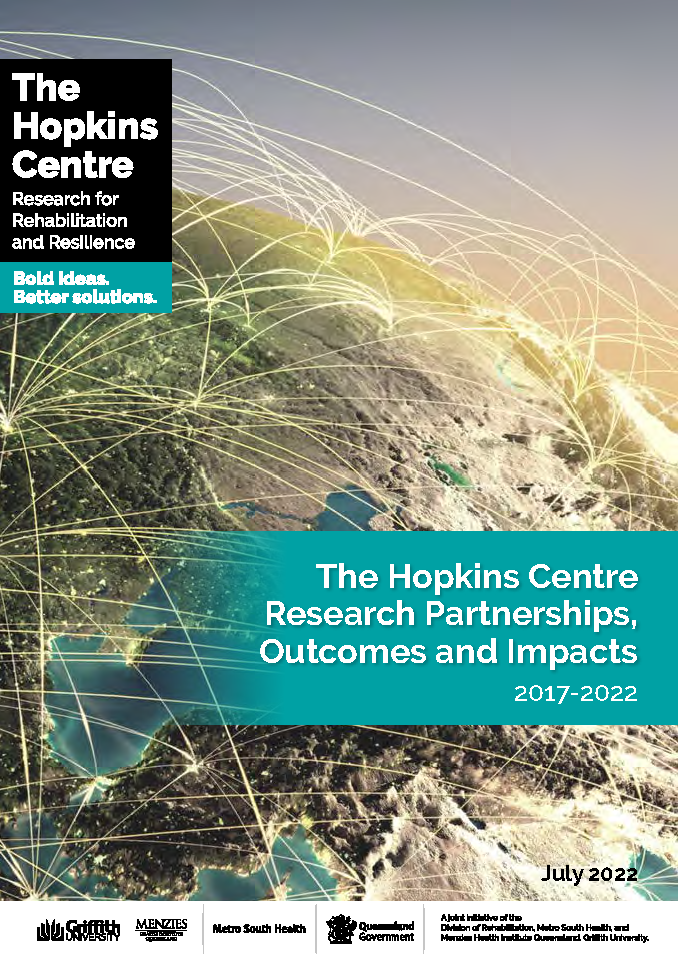Our Five Year Journey: The Hopkins Centre Research Partnerships, Outcomes and Impacts
The Hopkins Centre 5 Year Report
5 years of The Hopkins Centre, thanks to MAIC
In 2017, The Hopkins Centre had a vision to be a bold leader in interdisciplinary research into the needs of people with severe disability and to be renowned for translating evidence into policy, practice and service delivery in ways that maximised outcomes.
Our mission was to find better solutions to complex challenges by bringing people together across disciplines and sectors, working in ways that centred and valued people with disability at the core. Our value of upholding of dignity and respect for experiential knowledge in everything we do was identified by our members as one of the most important aspects of our work, by our members, and remains firm to today.
Three major flagship programs were developed and established - our signature research projects - which formed the platform for broad scale policy change, systemic endeavours and the evolution of other projects which continue to contribute to the field:
1. The Dignity Project addresses the way in which services are delivered and the need for more consumer voice.
2. HabITec is addressing the lack of knowledge about technology and opportunities to apply advanced environmental modifications across the rehabilitation continuum.
3. TRaCE is informing understanding of the rehabilitation continuum through systemic data collection and analysis.

Seed & Translation Grants Program
Our seed grants are a proven effective model for bringing clinical expertise together with research evidence to inform a local service need or challenge. These grants have a strong focus on translation into practice and building clinical and research capacity. Over this 5 year period, 28 seed grants have investigated a range of topics across: symptom management, mental and physical health, novel technology applications, medical innovation, opioid prescription, neuroimaging and community support models.
Our Ambassador Council
Promotes citizen engagement in research, with many projects either being led by citizen researchers or involving active citizen engagement. The Ambassador Council members work wit THC researchers to ensure research conducted in the centre is in line with the needs of those who use disability and rehabilitation services, and address topics of relevance and importance to the community with lived experience. Some of our Ambassador-led programs include:
· Singing Cords – is a collaborative program which began as a 24 session pilot feasibility study for respiratory health and wellness, and continues today as part of routine leisure therapies for NIISQ and CTP participants at PAH.
· Ballet for Brain Injury – a tailored dance program designed to engage people living with brain injury and their carers/family/support workers in ballet, which still continues on a weekly basis at Queensland Ballet.
· Enabled VIP – a not-for-profit virtual business incubator for Australians who live with a disability, assisting members to monetise a hobby or craft, to establish gig-based micro-business or even a small business.
Clinical Fellowships
Clinical fellowships create an opportunity for clinicians and collaborators to develop research projects which address challenges in clinical practice that are relevant to their work. They form an integral part of our approach to embedded models of research that promote continuous, positive relationships and interactions between clinicians, researchers and key end-users.
Looking Forward
We are proud that our approach of co-design and placing lived experience at the core of our work has been at the forefront of the emerging trend in clinical design competitive research grants and the production of policy which is now a requirement.
While the last 5 years has seen us conduct over 100 collaborative research projects that have supported clinicians and consumers to drive and be involved in projects in areas that matter, the next 5 years will enable us to build the capacity of our flagship programs, strengthen our links with the decision-makers who can apply our consumer and clinician-led research to social change. This will be important as we head towards large-scale events such as the 2032 Olympics and Paralympics and continue to drive positive change. We want to ensure that everyone who rquires rehabilitation can access this vital service.
We are sincerely grateful to MAIC for the opportunity make such an impact over the last 5 years and to be able to continue to deliver benefits to people injured in road traffic crashes for decades to come.
Events
Our sixth annual Better Ideas Bold Solutions symposium (BIBS22), held on Wednesday 30th November 2022, via Zoom Webinar, was a celebration and showcase of the outcomes and impacts of The Hopkins Centre's interdiciplinary and translational work from the last 5 years of research exploring bold ideas that are being translated into better solutions for the future.

